|
In the seventies the Greek military Junta is no match for the tide of sex, drugs and rock and roll as the Greek islands become a haven for international youth and Athens throws off its shackles.
|
|
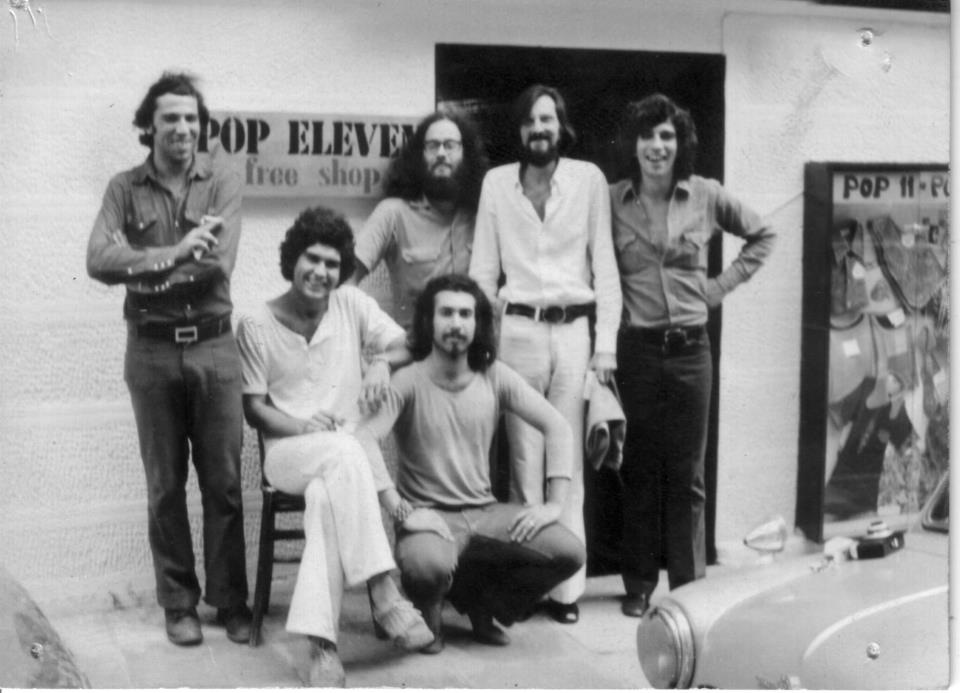 In the seventies the Junta's efforts to protect the Greek youth from the ills of western culture begins to fall apart. Because tourism is such an important part of the Greek economy, the bans
on mini-skirts, long hair and
other symbols of decadence are not enforced. As long haired westerners are heading overland to India some are bringing LSD from Europe. When some return they are carrying hashish from Turkey and Afghanistan. Two new record stores, Pop 11 and Blow-up are importing cool albums from the UK, and there are more underground radio stations than ever, almost all of them owned by young people
and playing
hard rock like Deep Purple, Jethro Tull, Black Sabbath, Free, and other British groups. The Greek islands have become a stopping point on the road between Europe and India. Places like Paradise Beach in Mykonos and Matala, Crete become hippy colonies, made up mostly of foreigners and a handful of adventurous young Greeks. The island of Ios is just starting to become known as a center for young people and sleeping on the beach if not actually legal, is common. There are cheap pensions and even in Athens you
can
sleep on the roof of a hotel for a few drachmas. It is these young people who flock to the islands for sun and sea and cheap prices despite the dictatorship, who return with their families decades later, turning Greece into one of the world's most popular tourist destinations. In the seventies the Junta's efforts to protect the Greek youth from the ills of western culture begins to fall apart. Because tourism is such an important part of the Greek economy, the bans
on mini-skirts, long hair and
other symbols of decadence are not enforced. As long haired westerners are heading overland to India some are bringing LSD from Europe. When some return they are carrying hashish from Turkey and Afghanistan. Two new record stores, Pop 11 and Blow-up are importing cool albums from the UK, and there are more underground radio stations than ever, almost all of them owned by young people
and playing
hard rock like Deep Purple, Jethro Tull, Black Sabbath, Free, and other British groups. The Greek islands have become a stopping point on the road between Europe and India. Places like Paradise Beach in Mykonos and Matala, Crete become hippy colonies, made up mostly of foreigners and a handful of adventurous young Greeks. The island of Ios is just starting to become known as a center for young people and sleeping on the beach if not actually legal, is common. There are cheap pensions and even in Athens you
can
sleep on the roof of a hotel for a few drachmas. It is these young people who flock to the islands for sun and sea and cheap prices despite the dictatorship, who return with their families decades later, turning Greece into one of the world's most popular tourist destinations.
|
|
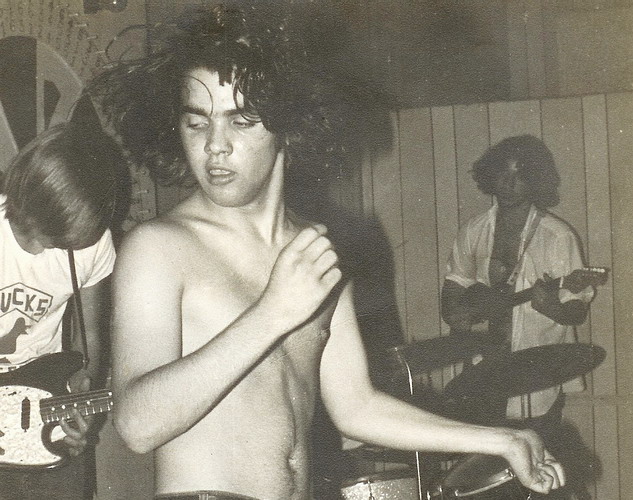 For the Greeks of high school and college age, drug use is uncommon. It is still the realm of the artists and musicians for the most part. But in the American community it
is spreading
among high school students and
US airmen as well as the sailors from the 6th fleet now based in Faliron Bay. For these young people drugs can be bought easily and as foreigners, particularly as American foreigners, they live in a protective bubble. Unknown to the Junta Colonels and the American military, Embassy and CIA who are working to create a solid anti-communist capitalist society, their children are undermining them, turning their friends on to hashish and acid, listening to the MC5: Kick Out
The Jams and
passing around books like Jerry Rubin's Do-it, and Abbie Hoffman's Woodstock Nation. In the American high school the rock group CC Bluesking are introducing kids to their Iggy-on-drugs-inspired guitar and feedback oriented music, a sound truly ahead of its time. (Their bass-player, Yanni Vavoura goes on to become
the Godfather of Greek punk years later.) While any kind of
student protest
is forbidden in the Greek schools, in 1971 a group of Greek-Americans at the American high school stage a protest and close down the school for a day making demands on the administration which are unrealistic to say the least, mostly having to do with being allowed to smoke on campus, non-mandatory class attendance, and the one demand which might be considered vaguely revolutionary, having free use of the school's mimeograph machine, though for what purpose we can only guess. The US military influenced
school board responds by firing a favorite teacher, Jack Marlowe. When asked why the students did it they shrugged their shoulders and admitted they had read Abbie Hoffman's Revolution for the Hell of It and it seemed like a cool thing to do. Had this happened in one of the Greek high schools one can only wonder what the response would have been. For the Greeks of high school and college age, drug use is uncommon. It is still the realm of the artists and musicians for the most part. But in the American community it
is spreading
among high school students and
US airmen as well as the sailors from the 6th fleet now based in Faliron Bay. For these young people drugs can be bought easily and as foreigners, particularly as American foreigners, they live in a protective bubble. Unknown to the Junta Colonels and the American military, Embassy and CIA who are working to create a solid anti-communist capitalist society, their children are undermining them, turning their friends on to hashish and acid, listening to the MC5: Kick Out
The Jams and
passing around books like Jerry Rubin's Do-it, and Abbie Hoffman's Woodstock Nation. In the American high school the rock group CC Bluesking are introducing kids to their Iggy-on-drugs-inspired guitar and feedback oriented music, a sound truly ahead of its time. (Their bass-player, Yanni Vavoura goes on to become
the Godfather of Greek punk years later.) While any kind of
student protest
is forbidden in the Greek schools, in 1971 a group of Greek-Americans at the American high school stage a protest and close down the school for a day making demands on the administration which are unrealistic to say the least, mostly having to do with being allowed to smoke on campus, non-mandatory class attendance, and the one demand which might be considered vaguely revolutionary, having free use of the school's mimeograph machine, though for what purpose we can only guess. The US military influenced
school board responds by firing a favorite teacher, Jack Marlowe. When asked why the students did it they shrugged their shoulders and admitted they had read Abbie Hoffman's Revolution for the Hell of It and it seemed like a cool thing to do. Had this happened in one of the Greek high schools one can only wonder what the response would have been.
|
|
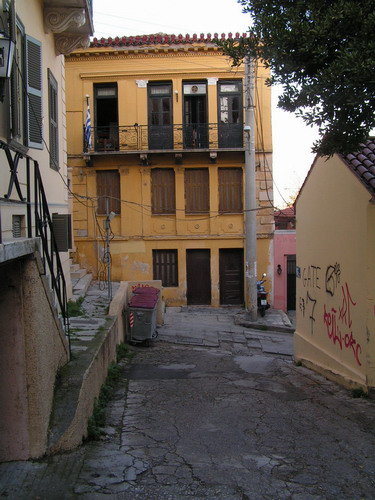 In the Plaka there are several hip clubs that have found a place among the restaurants, bouzoukia clubs and discos. One is The Odyssey,
also known as 'the
Trip' which plays contemporary danceable rock like Santana, Led Zeppelin, and the endless Ina-gadda-davida by Iron Butterfly. Two blocks away, anchoring the corner of the Plaka that borders the ancient Athenian Agora are two other
clubs. Folk
17 is a small Greenwich Village style live folk club where musicians, some who are just passing through on the way to the East or on their way home, perform The Needle and the Damage Done or any of a number of Cat Stevens songs. The other club is the Golden Key, a tiny place which plays the hippest music in Athens and is notorious for
being a hangout
for drug users, meaning young people who smoke hashish or take LSD. The clubs make little money. Most people are already stoned when they get there and will sit all night with one drink. The street and steps between these two clubs is a gathering place for young Greeks and foreigners, kids from the American high school, airmen from the American base, sailors from the 6th fleet, and hippies from all over the world. Though the mood is generally happy and effusive, each night a police car makes its way
up the small street and stops in front of the club and waits. The music stops as police officers go into the club and check identification, often leaving with two or three young Greeks, rarely foreigners. If you have an American passport, especially a diplomatic one, your eyes can be rolling around like loose marbles and they still leave you alone. After the police drive away the music begins and everyone wonders what the people arrested had done, what will happen to them and will they ever come back?
Drug penalties are harsh. The concept of 'recreational use' does not exist. If you are busted unless you are very well connected you get 10 years or longer in prison. The idea of kids just partying is meaningless. When the Greek police arrest a handful of young people with a piece of hashish, in their view they have broken up a 'notorious gang of drug users'. This is what
it was like
to be young and hip under a military dictatorship. In the Plaka there are several hip clubs that have found a place among the restaurants, bouzoukia clubs and discos. One is The Odyssey,
also known as 'the
Trip' which plays contemporary danceable rock like Santana, Led Zeppelin, and the endless Ina-gadda-davida by Iron Butterfly. Two blocks away, anchoring the corner of the Plaka that borders the ancient Athenian Agora are two other
clubs. Folk
17 is a small Greenwich Village style live folk club where musicians, some who are just passing through on the way to the East or on their way home, perform The Needle and the Damage Done or any of a number of Cat Stevens songs. The other club is the Golden Key, a tiny place which plays the hippest music in Athens and is notorious for
being a hangout
for drug users, meaning young people who smoke hashish or take LSD. The clubs make little money. Most people are already stoned when they get there and will sit all night with one drink. The street and steps between these two clubs is a gathering place for young Greeks and foreigners, kids from the American high school, airmen from the American base, sailors from the 6th fleet, and hippies from all over the world. Though the mood is generally happy and effusive, each night a police car makes its way
up the small street and stops in front of the club and waits. The music stops as police officers go into the club and check identification, often leaving with two or three young Greeks, rarely foreigners. If you have an American passport, especially a diplomatic one, your eyes can be rolling around like loose marbles and they still leave you alone. After the police drive away the music begins and everyone wonders what the people arrested had done, what will happen to them and will they ever come back?
Drug penalties are harsh. The concept of 'recreational use' does not exist. If you are busted unless you are very well connected you get 10 years or longer in prison. The idea of kids just partying is meaningless. When the Greek police arrest a handful of young people with a piece of hashish, in their view they have broken up a 'notorious gang of drug users'. This is what
it was like
to be young and hip under a military dictatorship.
|
|
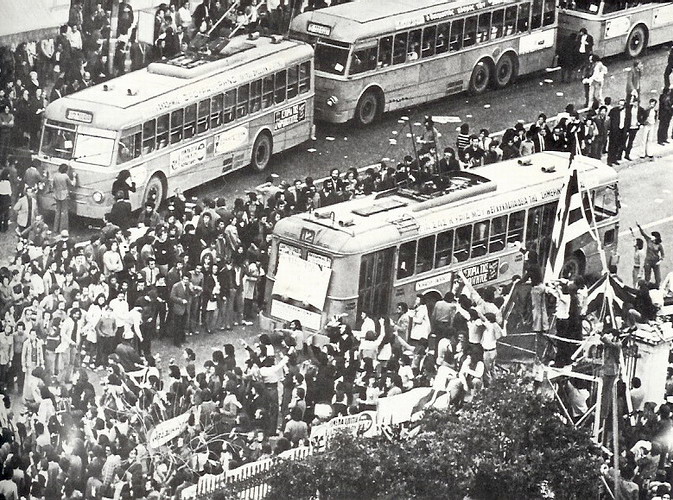 On November 14th of 1973 students begin gathering at the Athens Polytechnic to demonstrate against the Junta. This demonstration which is coordinated with occupations
of campuses
in Patras and Thessaloniki, turns
into a student rebellion that gathers strength every day as more and more people join, some students but many working class and the well-educated. On the 16th the students and fellow demonstrators attempt to march from the Polytechnic to Syntagma square but they are halted by the police. As more people gather at the Polytechnic, already there are plans for ending the student rebellion, using tanks from the nearby bases in and around Athens. The students are preparing for a siege, collecting food and medical supplies,
building barricades and broadcasting on a clandestine radio station that the time is right to overthrow the junta and calling for their countrymen to join them in central Athens. Anti-Junta and anti-American graffiti is painted on buildings and passing buses which spread their message throughout the city. On November 14th of 1973 students begin gathering at the Athens Polytechnic to demonstrate against the Junta. This demonstration which is coordinated with occupations
of campuses
in Patras and Thessaloniki, turns
into a student rebellion that gathers strength every day as more and more people join, some students but many working class and the well-educated. On the 16th the students and fellow demonstrators attempt to march from the Polytechnic to Syntagma square but they are halted by the police. As more people gather at the Polytechnic, already there are plans for ending the student rebellion, using tanks from the nearby bases in and around Athens. The students are preparing for a siege, collecting food and medical supplies,
building barricades and broadcasting on a clandestine radio station that the time is right to overthrow the junta and calling for their countrymen to join them in central Athens. Anti-Junta and anti-American graffiti is painted on buildings and passing buses which spread their message throughout the city.
|
|
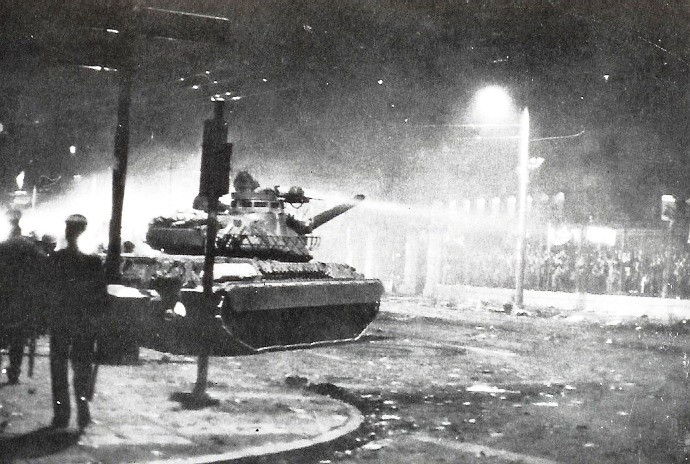 At 2am on November 17th the tanks Papadopoulos has ordered to crush the student rebellion arrive at the Polytechnic. At 2:15 a group of students come out to negotiate
a surrender
asking for half an hour to
evacuate the campus. The officers in charge will only give them fifteen minutes but don't even wait for ten. At 3am a tank crashes through the gate of the polytechnic and police and military storm the campus. As the gate crashes to the ground students rush out to escape and are beaten with clubs and arrested. At least 34 demonstrators are killed though there are rumors that the number is much higher. Several hundred are injured and almost a thousand are arrested at the school and at the Ministry
of Public Order which had been under siege by demonstrators. Oddly most of the wounded have been admitted into the hospitals with bullet wounds before the army ever got to the school. Of the police and the army the injuries are few and relatively minor, none with bullet wounds. On the other hand the police had fired some 24,000 rounds. Though police claimed the demonstrators had destroyed Ministry and University property damage to buildings in both locations is minor. Read Newspaper Account At 2am on November 17th the tanks Papadopoulos has ordered to crush the student rebellion arrive at the Polytechnic. At 2:15 a group of students come out to negotiate
a surrender
asking for half an hour to
evacuate the campus. The officers in charge will only give them fifteen minutes but don't even wait for ten. At 3am a tank crashes through the gate of the polytechnic and police and military storm the campus. As the gate crashes to the ground students rush out to escape and are beaten with clubs and arrested. At least 34 demonstrators are killed though there are rumors that the number is much higher. Several hundred are injured and almost a thousand are arrested at the school and at the Ministry
of Public Order which had been under siege by demonstrators. Oddly most of the wounded have been admitted into the hospitals with bullet wounds before the army ever got to the school. Of the police and the army the injuries are few and relatively minor, none with bullet wounds. On the other hand the police had fired some 24,000 rounds. Though police claimed the demonstrators had destroyed Ministry and University property damage to buildings in both locations is minor. Read Newspaper Account
|
|
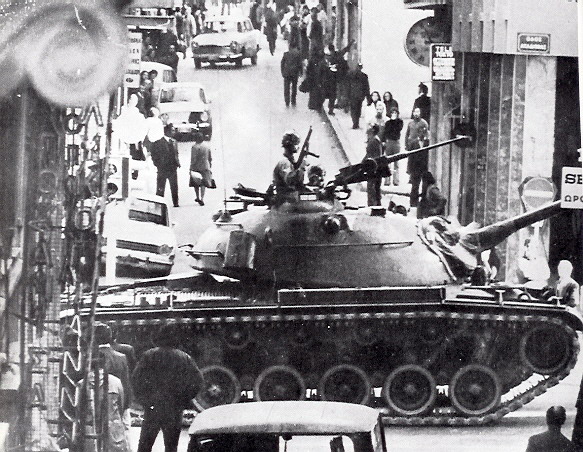 For the next two days crowds attempting to gather in central Athens are broken up by police and soldiers who are everywhere. Tanks are parked in squares
around the
city and surround the Parliament
building. The rebellion at the Polytechnic is over and the country is put under martial law for the next week. Groups larger than four people are not permitted to gather and there is a curfew between 7pm and 5am. Former politicians George Mavros, Panayiotis Kannelopoulos and Ioannis Zigdis and a number of professors are arrested. There are still small demonstrations around the city and a number of people are shot during this week, some for breaking the curfew. In
my neighborhood
of Agia Paraskevis there was a tank on the corner that I had to sneak past to visit my friend Gael Murphy. My friend Harry kept me informed by phone on what was going on in Syntagma Square, where he lived. I recorded our conversation and typed it out and handed it in for my drama class in college and got an A. (Gael became one of the founders of Code Pink.) For the next two days crowds attempting to gather in central Athens are broken up by police and soldiers who are everywhere. Tanks are parked in squares
around the
city and surround the Parliament
building. The rebellion at the Polytechnic is over and the country is put under martial law for the next week. Groups larger than four people are not permitted to gather and there is a curfew between 7pm and 5am. Former politicians George Mavros, Panayiotis Kannelopoulos and Ioannis Zigdis and a number of professors are arrested. There are still small demonstrations around the city and a number of people are shot during this week, some for breaking the curfew. In
my neighborhood
of Agia Paraskevis there was a tank on the corner that I had to sneak past to visit my friend Gael Murphy. My friend Harry kept me informed by phone on what was going on in Syntagma Square, where he lived. I recorded our conversation and typed it out and handed it in for my drama class in college and got an A. (Gael became one of the founders of Code Pink.)
|
|
 In a meeting at the Greek pentagon President
Markazenis congratulates the army on their "timely and bloodless
intervention". 28 student organizations around the country
are dissolved and their assets confiscated. On the night the curfew is lifted, one week
after the military had ended the protest at the Polytechnic, the Colonels are overthrown
in a bloodless coup by
a more hardliner faction of the junta, led by Dimitris Ioannides, the
head of the dreaded military police. General Phaedon Gizikis becomes President
of the Republic and Adamandios Androutsopoulos becomes Prime Minister. Though
at first it is believed that this new group has overthrown Papadopoulos
because they objected to the way the student demonstration had been
handled, in reality the coup had been planned long in advance. It
has been written that the Junta of April 21 was overthrown because they refused to allow the
US to put nuclear weapons on bases in Elefsina and Crete. It is an interesting
theory since one of the first things the new group did was allow the bases that
the previous government had denied the Americans. What is known is that the
members of this second group were against the new constitution which
would have elevated the power of Papadopoulos to something of a
Cesar,
created a civilian government free of any of the other original
junta members, and would have given the country free elections. In
an effort to get favorable public opinion the new government releases
all those arrested during the Polytechnic demonstrations and declares
that censorship
is abolished. A week later the newspaper Vradyni is banned and
the week after that the newspaper Christianiki is also closed.
As with the first Junta many Greeks believe this one has been instigated
by the CIA, but again, the reactions of the US to the change in
government is so confused that foreknowledge is unlikely. Still the
Americans are not complaining too loudly. Ioannides is a good
soldier and more anti-communist than nationalist which will come
in handy in dealing with Turkey over Cyprus and the discovery of
oil in the disputed waters between Greece and Turkey. In a meeting at the Greek pentagon President
Markazenis congratulates the army on their "timely and bloodless
intervention". 28 student organizations around the country
are dissolved and their assets confiscated. On the night the curfew is lifted, one week
after the military had ended the protest at the Polytechnic, the Colonels are overthrown
in a bloodless coup by
a more hardliner faction of the junta, led by Dimitris Ioannides, the
head of the dreaded military police. General Phaedon Gizikis becomes President
of the Republic and Adamandios Androutsopoulos becomes Prime Minister. Though
at first it is believed that this new group has overthrown Papadopoulos
because they objected to the way the student demonstration had been
handled, in reality the coup had been planned long in advance. It
has been written that the Junta of April 21 was overthrown because they refused to allow the
US to put nuclear weapons on bases in Elefsina and Crete. It is an interesting
theory since one of the first things the new group did was allow the bases that
the previous government had denied the Americans. What is known is that the
members of this second group were against the new constitution which
would have elevated the power of Papadopoulos to something of a
Cesar,
created a civilian government free of any of the other original
junta members, and would have given the country free elections. In
an effort to get favorable public opinion the new government releases
all those arrested during the Polytechnic demonstrations and declares
that censorship
is abolished. A week later the newspaper Vradyni is banned and
the week after that the newspaper Christianiki is also closed.
As with the first Junta many Greeks believe this one has been instigated
by the CIA, but again, the reactions of the US to the change in
government is so confused that foreknowledge is unlikely. Still the
Americans are not complaining too loudly. Ioannides is a good
soldier and more anti-communist than nationalist which will come
in handy in dealing with Turkey over Cyprus and the discovery of
oil in the disputed waters between Greece and Turkey.
|
|
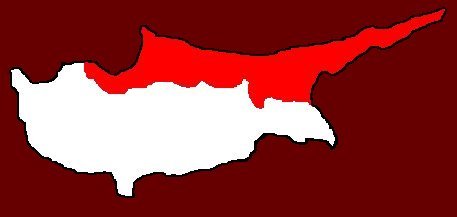 In the summer
of 1974 in Cyprus, Archbishop Markarios demands the removal of Greek officers from the
Cypriot National Guard. The Athens government launches a coup using the Cypriot
National Guard and announces
over the radio that Archbishop Markarios is dead, buried under rubble in his palace. Nikos
Sampson one of the most ruthless of General Grivas' EOKA (National
Organization of Cypriot Fighters) is sworn in as the President of Cyprus and there are reports
of murders of Makarios supporters by members of this group. Imagine
the surprise of the Cypriot people to hear the voice of their leader, Makarios,
who has survived the attempt on his life and escaped the island, telling
them to resist the Junta. Turkey, realizing that this is a plot to unite Cyprus with
Greece, invade, supposedly to protect the Turkish minority, on the night of July 19th with
a plan that was code-named 'Attila I', named after Attila the Hun. (See the Michael Cacoyanis movie of the
same name). Again the Americans could hardly complain about the coup since
President Nixon viewed Makarios as "the Castro of the Mediterranean".
But the fact that Makarios had survived the coup made a big mess for everybody
involved, especially a few days later when he makes an eloquent
speech to the United Nations Security Council accusing the Athens
Junta of being behind the coup. During the negotiations on the Cyprus
issue in Geneva which follow, the Turkish military continues to take more territory
on the island. In the summer
of 1974 in Cyprus, Archbishop Markarios demands the removal of Greek officers from the
Cypriot National Guard. The Athens government launches a coup using the Cypriot
National Guard and announces
over the radio that Archbishop Markarios is dead, buried under rubble in his palace. Nikos
Sampson one of the most ruthless of General Grivas' EOKA (National
Organization of Cypriot Fighters) is sworn in as the President of Cyprus and there are reports
of murders of Makarios supporters by members of this group. Imagine
the surprise of the Cypriot people to hear the voice of their leader, Makarios,
who has survived the attempt on his life and escaped the island, telling
them to resist the Junta. Turkey, realizing that this is a plot to unite Cyprus with
Greece, invade, supposedly to protect the Turkish minority, on the night of July 19th with
a plan that was code-named 'Attila I', named after Attila the Hun. (See the Michael Cacoyanis movie of the
same name). Again the Americans could hardly complain about the coup since
President Nixon viewed Makarios as "the Castro of the Mediterranean".
But the fact that Makarios had survived the coup made a big mess for everybody
involved, especially a few days later when he makes an eloquent
speech to the United Nations Security Council accusing the Athens
Junta of being behind the coup. During the negotiations on the Cyprus
issue in Geneva which follow, the Turkish military continues to take more territory
on the island.
|
|
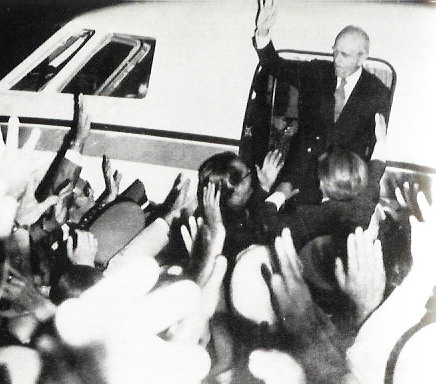 In
Athens the Turkish invasion of Cyprus has taken the Junta completely by surprise.
The Greek mobilization
is lacking in enthusiasm. Nobody in their right mind wants to go to war with Turkey over Cyprus, and probably get killed,
for a government they do not support. The whole thing
is a national humiliation and the military knows they have little
chance
against Turkey in an all out war. The members of the Junta all agree
that Ioannides has screwed up royally and must go. Ioannides himself sees
the writing on the wall
and leaves quietly though he retains control of the secret police.
On July 23rd President Gizikis phones Constantine Karamanlis
in Paris and invites him back to Greece. Karamanlis flies from
Paris on the French President's private jet and is sworn in at 4:30 am on July 24 1974
while a jubilant Athens celebrates. His job is simple. Clean up the disaster
the dictators have left behind and bring democracy back to Greece. Karamanlis,
who had been seen by many Greeks as a puppet of the Americans during
his rule in the fifties now appears as savior. He has what
most men who have made mistakes in life want but few get: A second
chance. In
Athens the Turkish invasion of Cyprus has taken the Junta completely by surprise.
The Greek mobilization
is lacking in enthusiasm. Nobody in their right mind wants to go to war with Turkey over Cyprus, and probably get killed,
for a government they do not support. The whole thing
is a national humiliation and the military knows they have little
chance
against Turkey in an all out war. The members of the Junta all agree
that Ioannides has screwed up royally and must go. Ioannides himself sees
the writing on the wall
and leaves quietly though he retains control of the secret police.
On July 23rd President Gizikis phones Constantine Karamanlis
in Paris and invites him back to Greece. Karamanlis flies from
Paris on the French President's private jet and is sworn in at 4:30 am on July 24 1974
while a jubilant Athens celebrates. His job is simple. Clean up the disaster
the dictators have left behind and bring democracy back to Greece. Karamanlis,
who had been seen by many Greeks as a puppet of the Americans during
his rule in the fifties now appears as savior. He has what
most men who have made mistakes in life want but few get: A second
chance.
|
|
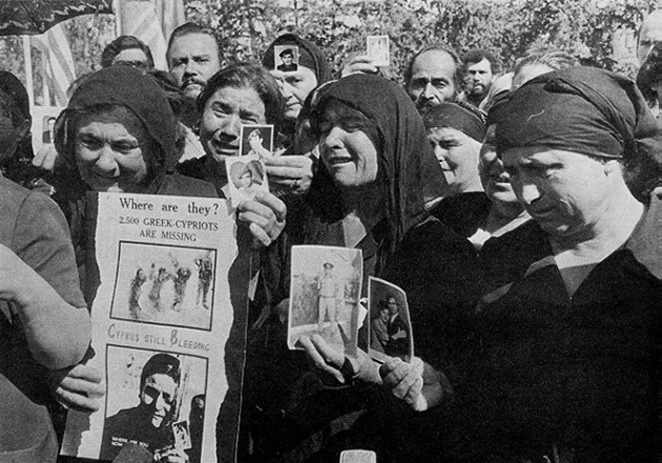 In the aftermath of the Turkish invasion of Cyprus there are 4000
dead, 1619 missing, and 200,000 people displaced. The 40% of the island which
the Turks take contain 70% of the industry and mineral wealth, 80% of the
tourist attractions and 65% of the cultivated land. For those who accuse the
United States of being involved in the invasion it is interesting to note
that on the 15th of July there are two intelligence reports at the State Department's
SE Europe section office. One says that there is no imminent coup in Cyprus,
the other that it has already begun. Still the belief of many is that Henry
Kissinger is deeply involved in the calamity. But one can understand
the confusion of the US administration during the crisis of Cyprus
and the fall of the Athens Junta for even as all this is unfolding,
Richard Nixon is resigning as President of the United States over
the Watergate scandal and is replaced by Gerald Ford who had only recently replaced disgraced vice-president Spiro Agnew. Regardless of what the Americans knew or
didn't know, the Athens Junta's failed coup against Makarios
which led to the Turkish invasion of Cyprus is a tragedy that continues
to this day. Over 1500 Cypriot men, women and children are still missing. In the aftermath of the Turkish invasion of Cyprus there are 4000
dead, 1619 missing, and 200,000 people displaced. The 40% of the island which
the Turks take contain 70% of the industry and mineral wealth, 80% of the
tourist attractions and 65% of the cultivated land. For those who accuse the
United States of being involved in the invasion it is interesting to note
that on the 15th of July there are two intelligence reports at the State Department's
SE Europe section office. One says that there is no imminent coup in Cyprus,
the other that it has already begun. Still the belief of many is that Henry
Kissinger is deeply involved in the calamity. But one can understand
the confusion of the US administration during the crisis of Cyprus
and the fall of the Athens Junta for even as all this is unfolding,
Richard Nixon is resigning as President of the United States over
the Watergate scandal and is replaced by Gerald Ford who had only recently replaced disgraced vice-president Spiro Agnew. Regardless of what the Americans knew or
didn't know, the Athens Junta's failed coup against Makarios
which led to the Turkish invasion of Cyprus is a tragedy that continues
to this day. Over 1500 Cypriot men, women and children are still missing.
|
|










